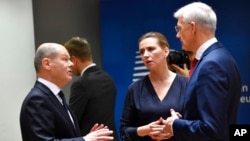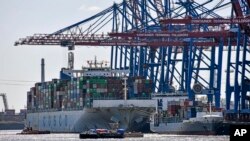EU leaders at a European Council summit in Brussels this week wrestled with how to respond to the rising economic and diplomatic power of China, even as Chinese leader Xi Jinping signaled his intention to sustain an aggressive foreign policy during a Communist Party congress in Beijing.
While largely preoccupied by the war in Ukraine, the leaders devoted more than three hours of their two-day summit ending Friday to “a strategic discussion on the European Union’s relations with China,” according to a tweet by the South China Morning Post’s Brussels-based correspondent.
Detailed reports of the discussion have yet to emerge, but the difficulty in bringing all 27 EU members to a common position was foreshadowed at a meeting of the bloc’s foreign ministers earlier in the week in Luxembourg.
In a brief statement issued at the conclusion of that Foreign Affairs Council meeting, the ministers said the European Council “reconfirmed the validity of the EU’s multifaceted approach on China” and described Beijing as “a partner with whom the EU must engage, a tough competitor and a systemic rival.”
EU sticking to its position
Analysts saw little new in the statement, which sought to bridge “a variety of approaches” by the various member states, according to Filip Sebok, a research fellow with the Prague-based Association for International Affairs.
“Overall, the EU is still sticking to the ‘partner, competitor, rival’ trifecta,” he said in an emailed interview with VOA. Although there is increasing emphasis on the systemic rivalry with China, “we should not expect a departure from the basic definition of the EU policy towards China in [the] short term.”
Charles Parton, a senior fellow at the Berlin-based Mercator Institute for China Studies, said the immediate challenge posed by the war in Ukraine “is obscuring the bigger, longer-term threat of China to [Europe’s] security, prosperity, data and values.”
Nevertheless, Parton thinks attitudes in the EU are slowly changing.
"The question is whether EU countries can tolerate the pain of actions, which are required to match that change of attitudes,” he said.
Parton, whose diplomatic career in the British foreign service included years of advising the EU delegation in Beijing on matters pertaining to China, pointed out the difficulty of bringing so many countries together on a common position.
“As ever, a central issue is whether the 27 can achieve unity of purpose and action,” he said. “A lowest common denominator approach may not be sufficient.”
Certainly, there is concern within the bloc about the intentions of the Chinese leader, who in an address to the party congress Sunday pledged to “resolutely safeguard the security of China’s state power, systems and ideology — and build up security capacity in key areas.”
“We will crack down hard on infiltration, sabotage, subversion and separatist activities by hostile forces,” Xi added in what was widely interpreted as a reference to the United States and its Western allies.
The head of Germany’s domestic intelligence service told the German parliament on Monday that the consensus among Western intelligence chiefs was that China posed the greatest long-term security and overall challenge.
“When I speak with foreign partners about China, they always say: Russia is the storm, China is climate change. So, we’re going to have to brace for this climate change in the coming years,” Thomas Haldenwang said.
“We must not allow a situation where the Chinese state can influence political events in Germany via critical infrastructures, where opportunities for sabotage are perhaps also opened up, where there’s also the possibility of influencing public opinions,” he warned.
Hamburg port
His warning came amid tension in Berlin over whether China should be allowed to purchase significant stakes in a port in Hamburg, one of Europe’s most important hubs.
German media have reported that Haldenwang’s intelligence service is one of six government agencies that oppose the plan. However, Chancellor Olaf Scholz, a former mayor of Hamburg, is said to support the Chinese investment.
Scholz confirmed on the sidelines of the Brussels summit that he would lead a delegation including business executives to visit China in the coming weeks.
Estonia’s prime minister, Kaja Kallas, expressed her reservation when questioned about Scholz’s travel plans, telling reporters Friday that she favored a whole EU approach and cautioning against deals that could threaten the unity of the bloc.





